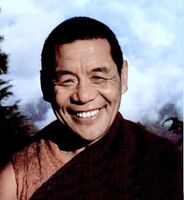Gyatso, Lobsang: Difference between revisions
No edit summary |
No edit summary |
||
| Line 6: | Line 6: | ||
|namefirst=Lobsang | |namefirst=Lobsang | ||
|namelast=Gyatso | |namelast=Gyatso | ||
|bio=Lobsang Gyatso was born in | |bio=Ven. Lobsang Gyatso was born in 1928 in a small village in eastern Tibet. He became a monk at the age of eleven, and later traveled to central Tibet to study at Drepung Monastery. After fleeing Tibet during the 1959 Tibetan Uprising, Gen Lobsang Gyatso, or “Gen la” as he was known at the Institute, eventually moved to Mussoorie to serve as a religious teacher at the Central School for Tibetans. | ||
In 1973, after being appointed by His Holiness to establish the Institute, he re-located to Dharamsala, India. After some difficult early years the Institute became one of the success stories of the Tibetan exile community. In 1991, Gen la expanded upon the already-successful work of the Institute with the founding of a new branch at Sarah, the College for Higher Tibetan Studies. Under his guidance, the Institute of Buddhist Dialectics and the College for Higher Tibetan Studies developed into uniquely valuable Tibetan educational institutions, offering integrated studies in both traditional Tibetan disciplines and modern subjects. | |||
While the establishment of the Institute of Buddhist Dialectics and the College for Higher Tibetan Studies at Sarah is the work for which Gen la will be best remembered, he was also an accomplished writer. | |||
A selection of Gen Lobsang Gyatso’s publications: | |||
* ''Harmony of Emptiness and Dependent-Arising'', Paljor Publications, 1992. | |||
* ''The Four Noble Truths'', Snow Lion Publications, 1994. | |||
* ''Bodhicitta: Cultivating the Compassionate Mind of Enlightenment'', Snow Lion Publications, 1997. | |||
* ''Memoirs of a Tibetan Lama'' by Gyatso, Lobsang (1990) Paperback, Snow Lion Publications, 1998. | |||
* ''Tsongkhapa’s Praise for Dependent Relativity'', Wisdom Publications, 2012. | |||
A Tibetan patriot, meditation master, and unswerving follower of the Dalai Lama, Gen la emerged as a fearless social critic, and a deeply spiritual man. On 5 February 1997, Gen Lobsang Gyatso and two of his assistants were brutally murdered in Dharamsala. ([https://tibetanwhoswho.wordpress.com/2018/12/13/ven-lobsang-gyatso/ Source Accessed Apr 19, 2021]) | |||
|PersonType=Authors of English Works; Tibetan Buddhist Teachers | |PersonType=Authors of English Works; Tibetan Buddhist Teachers | ||
|images=File:Gyatso Lobsang Tibetan Whos Who.jpg | |||
|yearbirth=1928 | |yearbirth=1928 | ||
|yeardeath=1997 | |yeardeath=1997 | ||
Revision as of 19:34, 19 April 2021
| PersonType | Category:Authors of English Works Category:Tibetan Buddhist Teachers |
|---|---|
| FirstName / namefirst | Lobsang |
| LastName / namelast | Gyatso |
| MainNamePhon | Lobsang Gyatso |
| SortName | Gyatso, Lobsang |
| bio | Ven. Lobsang Gyatso was born in 1928 in a small village in eastern Tibet. He became a monk at the age of eleven, and later traveled to central Tibet to study at Drepung Monastery. After fleeing Tibet during the 1959 Tibetan Uprising, Gen Lobsang Gyatso, or “Gen la” as he was known at the Institute, eventually moved to Mussoorie to serve as a religious teacher at the Central School for Tibetans.
In 1973, after being appointed by His Holiness to establish the Institute, he re-located to Dharamsala, India. After some difficult early years the Institute became one of the success stories of the Tibetan exile community. In 1991, Gen la expanded upon the already-successful work of the Institute with the founding of a new branch at Sarah, the College for Higher Tibetan Studies. Under his guidance, the Institute of Buddhist Dialectics and the College for Higher Tibetan Studies developed into uniquely valuable Tibetan educational institutions, offering integrated studies in both traditional Tibetan disciplines and modern subjects. While the establishment of the Institute of Buddhist Dialectics and the College for Higher Tibetan Studies at Sarah is the work for which Gen la will be best remembered, he was also an accomplished writer. A selection of Gen Lobsang Gyatso’s publications:
A Tibetan patriot, meditation master, and unswerving follower of the Dalai Lama, Gen la emerged as a fearless social critic, and a deeply spiritual man. On 5 February 1997, Gen Lobsang Gyatso and two of his assistants were brutally murdered in Dharamsala. (Source Accessed Apr 19, 2021) |
| YearBirth | 1928 |
| YearDeath | 1997 |
| IsInGyatsa | No |
| Other wikis |
http://en.wikipedia.org/wiki/Lobsang_Gyatso_%28monk%29 Template:Footer
